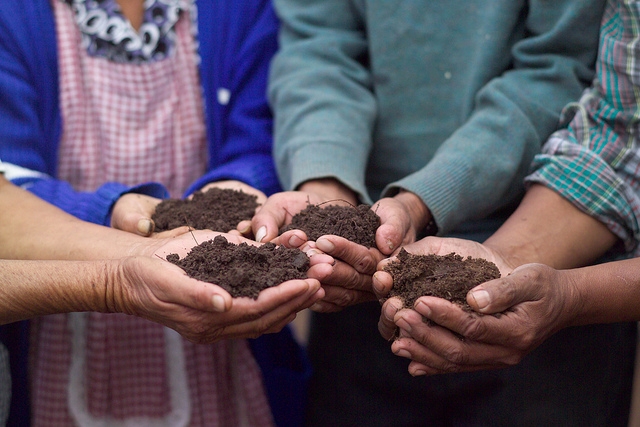
Chiara Martinelli from CIDSE shares her reflections after taking part in the workshop “Climate and agriculture: Harvesting people’s solutions for sustainable food systems” (Brussels, 19-21 September 2016), bringing together participants from the CIDSE network, partners and allies.
After three days of such an intense workshop, I really feel empowered. I feel encouraged to continue to work in promoting people-driven change. I learnt a great deal on climate and agriculture from the experts attending the workshop from all over the world. They brought into the discussion their struggles at the local level, their strengths and strategies to bring about a sustainable food production and consumption model in very different contexts, as well as their passion to continue in this transition.
We started the workshop by listening to 7 different experiences from Brazil, Togo, Belgium, Indonesia, Philippines and Zambia. Farmers and activists from different countries shared with us the common and great challenges they are facing due to the effects of climate change, agro-industrial exploitation and the current paradigm based on having “more”, doing things “fast” and individualism.
As Paula from La Via Campesina said, “climate change is not giving us the choice to wait for the right and fair policies and is not affecting all regions and individuals equally”. Indeed, it’s about an injustice to be addressed. The debate raised a strong sense of urgency and responsibility to act at all levels, especially vis-à-vis the most vulnerable regions.
Despite the challenges, however, the stories presented shed light on a growing movement across continents, where citizens and communities play a huge role in building sustainable food production and consumption habits and who unite everyday to resist to the dominant system. They helped us to consider the inter-linkages between climate and agriculture and showed us how agroecology responds as a solution, a holistic approach, a “way of life” and a set of practices that work, and which are more than a science. Agro-ecology represents a real alternative to the existing food system.
Putting people’s stories at the centre of the programme allowed to point out the importance and added value of citizens’ choices and engagement – from production to consumption, to activism in calling for policies and initiatives that could support, promote and give visibility to the already existing experiences worldwide and which show that a sustainable food system is possible. A strong emphasis has been put on the need to work to counter the dominant narrative on food and climate and therefore the crucial role of communication and citizen mobilization within our society.
As highlighted by Christophe from the GASAP Network in Belgium, at the heart of the change towards more sustainable food systems “there is a deep need to build new relations between farmers and consumers, relations based on shared risks”. To ask consumers for efforts in making choices, taking time and a long-term financial commitment and engagement, brings them closer to the farmer and allows trust and personal relations to flourish. This reverses completely the logic of the predominant model of food consumption.
Marcio from Brazil (ASPTA) affirmed that “giving farmers a face” is a crucial part of the strategy to scale out agro-ecological models. And, for example, we should promote local markets not only as a space to buy food but as a place for exchange, to stimulate discussion and to bring the production and consumption actors closer.
“Agro-ecology is not only an environmental-organic way of producing food – provoked one participant – “it is also a movement, a movement that also puts consumption at the core of the debate”. Through our campaign Change for the planet – Care for the people, we aim to call for a shift in food consumption habits and contribute to building a movement of active citizens carrying sustainable practices, citizens able to listen and learn from people’s solutions and each other’s stories, citizens that recognise the power of the collective and the power of sharing. That movement I saw among the 60 participants to the workshop in Brussels.
